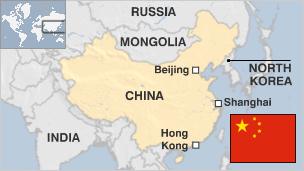China is the world's most populous country. It has a continuous culture stretching back nearly 4,000 years and originated many of the foundations of the modern world.
The People's Republic of China was founded in 1949 after the Communist Party defeated the nationalist Kuomintang, who retreated to Taiwan, creating two rival Chinese states - the People's Republic on the mainland and the Republic of China based on Taiwan.
After stagnating for decades under the rigid totalitarian socialism of founder Mao Zedong,
China reformed its economy along partly capitalist lines to make it one of the world's fastest-growing, as well its leading exporter. China is now a major overseas investor, and is pursuing an increasingly assertive foreign and defence policy.But economic change has not been matched by political reform, and the Communist Party retains a tight grip on political life and much of wider society.
Xi Jinping came to power in 2012-3 as the hand-picked heir of predecessor Hu Jintao, and is expected to lead China for the next decade.
Since taking over, he has concentrated power in his hands, in a move seen as a turning away from the traditional system of collective leadership, and has sought to present a modern face to China and the world.
His position as the most powerful Chinese leader since Mao Zedong was cemented in 2017 when his name and political philosophy was written into the Communist Party constitution by the National Congress.
In early 2018 the party also moved to allow him to remain in office indefinitely by abolishing the conventional two-term presidential limit.
The main themes of his leadership have been economic reform to boost market forces, as well as an anti-corruption campaign.
Mr Xi rejects Western ideas of constitutional democracy and human rights as models for China, and his government moved to silence voices critical of one-party rule, especially on social media.
China is the largest media market in the world.
Outlets operate under tight Communist Party control. The opening-up of the industry has extended to distribution and advertising, but not necessarily to editorial content.
Beijing tries to limit access to foreign news by restricting rebroadcasting and the reach of satellite TV, and by blocking websites using an extensive filtering system known as the "Great Firewall".
With 772 million users, China has the world's largest online population. Three powerful companies - Baidu, Alibaba and Tencent - dominate the market.
Tencent's WeChat messenger has more than 900 million users worldwide.
ca 1700-1046 BC - Shang Dynasty rules northern China - the first Chinese state for which clear written records remain.
221-206 BC - The Chinese heartland is united for the first time under the first emperor, Qin Shihuangdi.
1644 - A Manchu invasion from the north establishes the Qing Dynasty.
1911-12 - Military revolts lead to the proclamation of Republic of China under Sun Yat-sen and the abdication of the last Manchu emperor, but much of the country is taken over by unruly warlords.
1931-45 - Japan invades and establishes a brutal regime of occupation across large parts of China.
1949 1 October - Communist leader Mao Zedong proclaims the founding of the People's Republic of China after defeat of the nationalist Kuomintang in a civil war.
1950 -China sends People's Liberation Army (PLA) troops into Tibet, enforcing a longstanding claim.
1958-60 - Mao's "Great Leap Forward" disrupts agriculture, producing an economic breakdown, and is quickly abandoned after the loss of millions of lives.
1966-76 - Mao's "Cultural Revolution" produces massive social, economic and political upheaval.
1976 - Mao dies. From 1977 pragmatist Deng Xiaoping emerges as the dominant figure and undertakes far-reaching economic reforms.
1989 - Troops open fire on pro-democracy protesters in Beijing's Tiananmen Square, killing hundreds of people.
2010 - China becomes the world's second-largest economy after the United States, when Japan's economy shrank in the final months of the year.



No comments:
Post a Comment